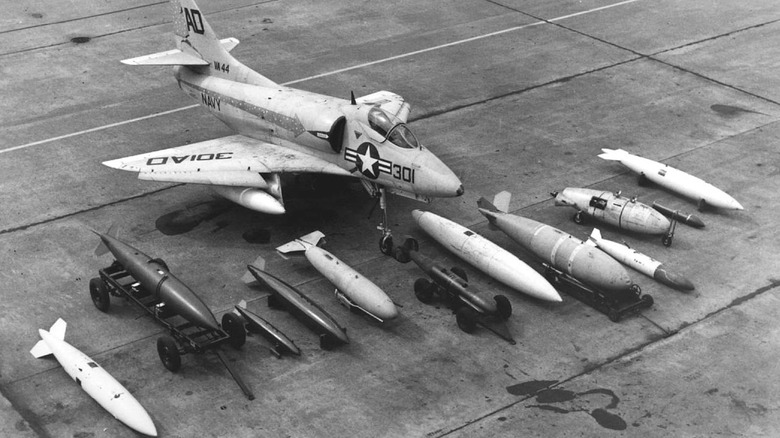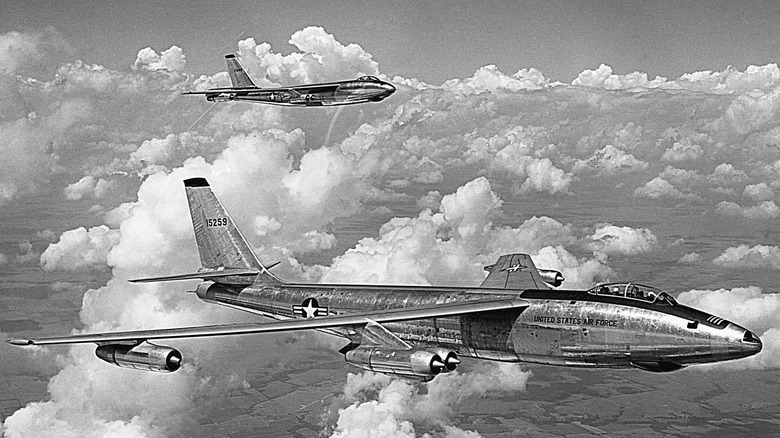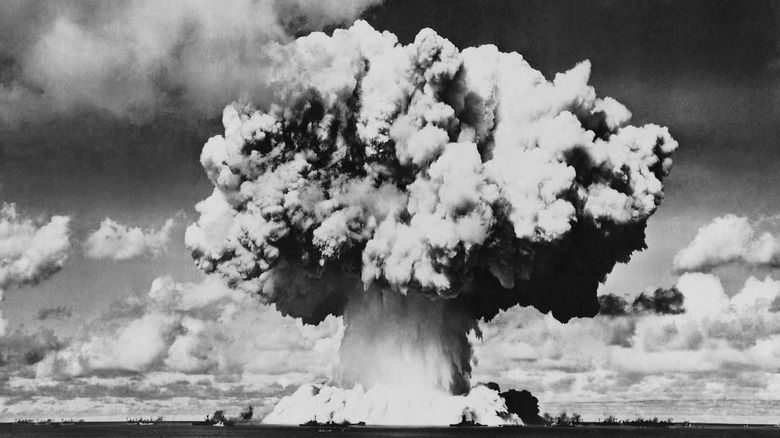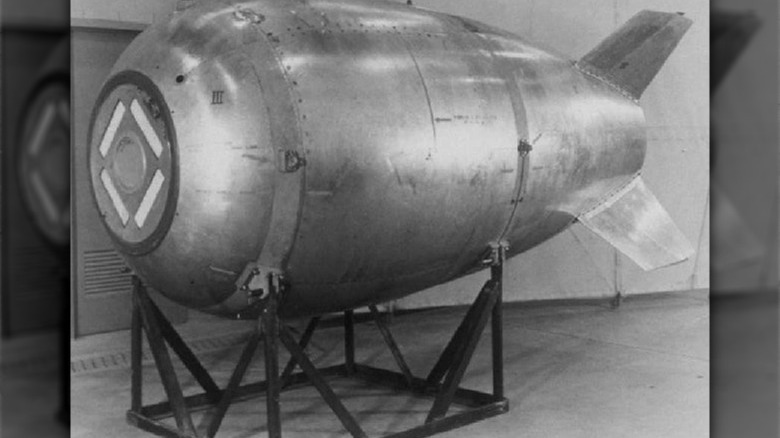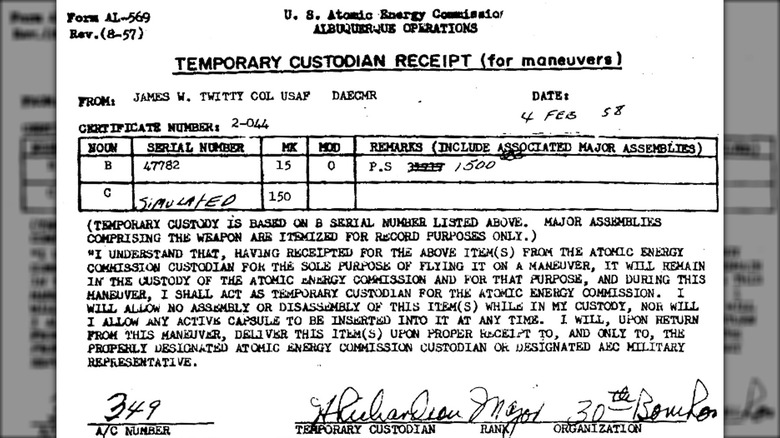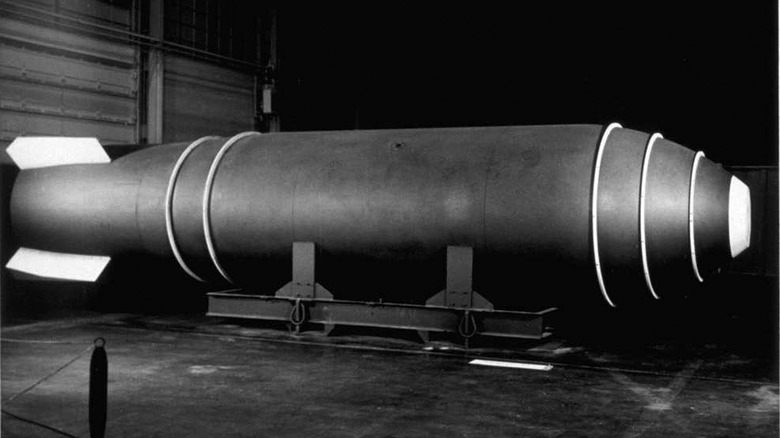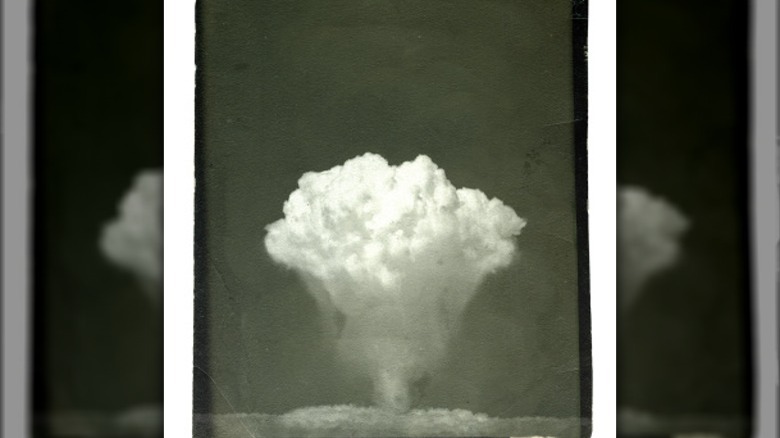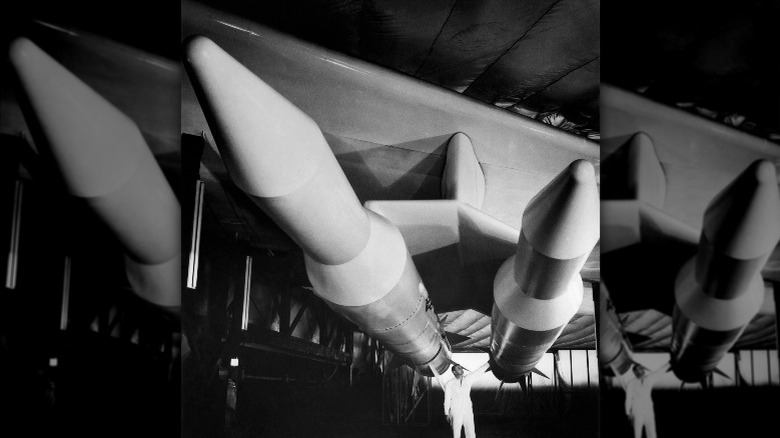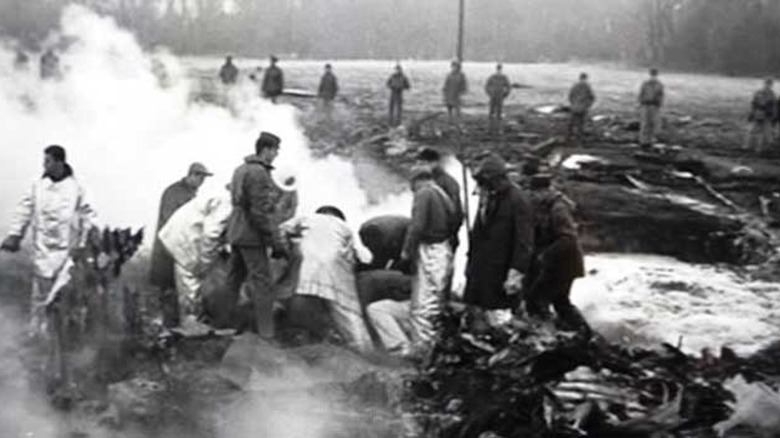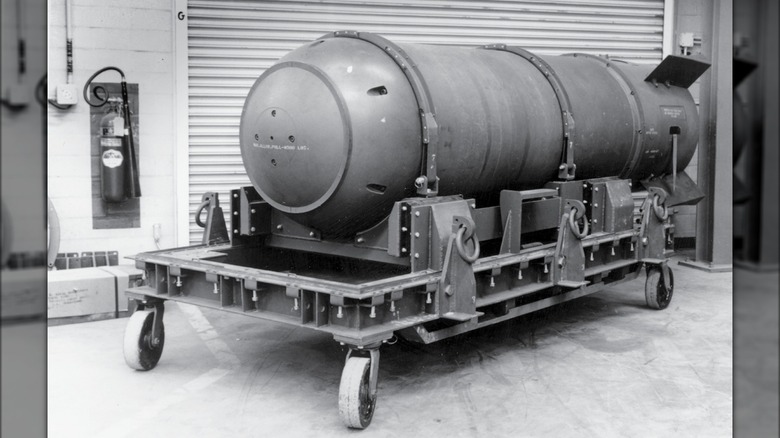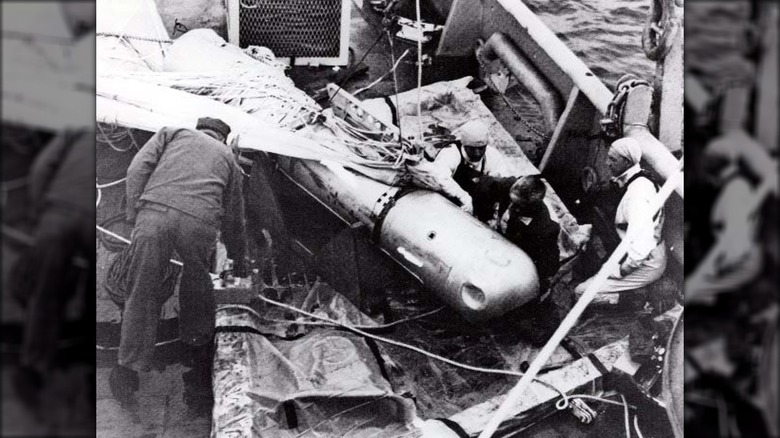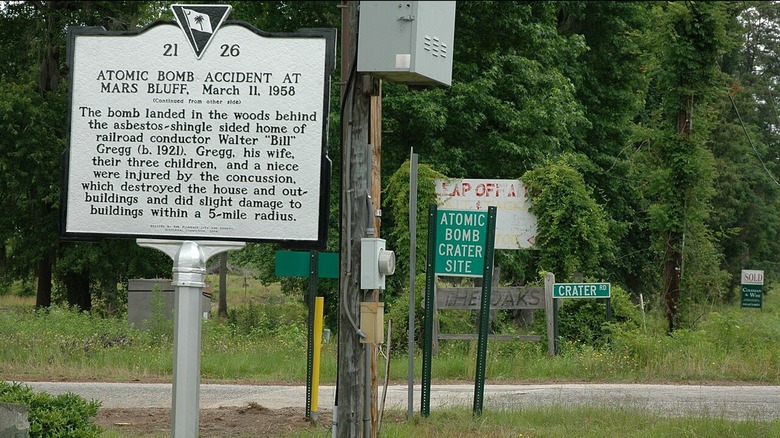The Untold Truth Of America's Missing Nuclear Bomb
Most of the time, when nuclear bombs are mentioned, people have a very specific idea of what's being talked about: the bombs dropped on Japan at the end of World War II, or maybe the numerous nuclear tests that were going on at Bikini Atoll. And while there are plenty of things to discuss about those events — ethics and morals, among other things — at the very least, in both of those cases, the details aren't exactly a mystery. History knows what happened to those weapons. As you'd hope would be true when it comes to weapons of mass destruction. Those aren't really the kinds of things you'd want just lying about somewhere, half-forgotten.
But here's the thing: That exact scenario has happened (and it's actually happened more than once), with one of the most infamous being that of the missing Tybee Bomb. Dropped in the water near Savannah, Georgia, during the late 1950s, the exact fate of this nuclear bomb is a bit murky, which has led to some pretty wild speculation, as well as genuine fears. And, of course, some strange twists and turns along the way.
How was the Tybee Bomb lost?
Well, the easiest place to start any story is from the beginning, so here are the basics behind just what the Tybee Bomb actually is. Basically, it all started on February 5, 1958, with a perfectly normal military training exercise. A jet was outfitted with a nuclear bomb (standard procedure for the time) for the purposes of that training mission, flying out from Florida, but in the skies over Georgia, disaster struck. All of a sudden, that plane collided with another plane (unrelated to said training exercise) in the middle of the air.
The pilot of that second plane was able to eject and land safely, but the pilot of the first plane had a pretty big problem to handle: the issue of a bomb being carried on board a damaged vessel. He tried to land the plane a few times at a Georgian Air Force base without success, and the very real possibility that the bomb could explode in the case of a crash or failed landing began to loom. So he made the decision to fly out over the ocean — specifically into an area known as the Wassaw Sound, near the city of Savannah — and drop the bomb into the water, after which point he managed to safely land the plane. The general area that the bomb was believed to have landed in was searched for a few months, but upon coming up empty, the Air Force officially declared it lost in mid-April of that same year.
Fears eventually spread about potential consequences
Of course, just the phrase "lost nuclear bomb" isn't one to inspire much faith or confidence. On the contrary, it's a pretty scary thought, and for obvious reason. As such, the people of Savannah, Georgia, began to fear for their lives. After all, there would certainly be consequences for just leaving a nuclear weapon under water for a long span of time, right?
There were a couple different forms that those fears took. Of course, there's the simple fact that this is a bomb with hundreds of pounds of explosives (and designed to be orders of magnitude more powerful than the one dropped on Hiroshima). Should it be disturbed, there's the chance it could end up going off, which is a fairly self-explanatory issue. But even short of explosion, there's the question of corrosion; aside from explosives, the bomb contains heavy metals, which could technically leak out into the water.
Then, there's the more human factor. A bomb just sitting out in the open waters, untracked and unaccounted for, could potentially look like a treasure trove of a destructive weapon. In particular, following the September 11 attacks, terrorism was a very prevalent fear for many, and so it didn't exactly sit well that the U.S. had just left a bomb out in the open, technically free for the taking (should anyone be lucky and committed enough to find it).
Search efforts resumed in the early 2000s
Despite the fact that a lost nuclear weapon is a terrifying prospect, the Tybee Bomb dropped off the radar for a pretty long time, at least when it came to public awareness of its existence. After all, the incident occurred in 1958, but it wasn't splashing across headlines for years; there weren't searches that spanned the decades. Rather, there was very little word of its existence — at least, that was true until the turn of the 21st century. And that's primarily due to the influence of one man: Derek Duke.
Duke is a retired Air Force officer, but not one who was ever involved with the Tybee Bomb incident. His interest was piqued by complete coincidence in the late 1990s, at which point he began researching it in his spare time, even getting into contact with the pilot who jettisoned the bomb decades earlier. And from there, his interest grew into something of a personal crusade. He contacted representative Jack Kingston about the matter — something which raised the story to such prominence that the Air Force actually wrote an entirely new report on it in 2001.
And Duke's ambition goes far beyond that (and, perhaps, a bit too far). He ended up deciding to take up the search himself, putting together his own crew of advisors and managing to get his hands on high-tech treasure hunting equipment.
It might not have truly been a nuclear weapon
When you read about the lost Tybee Bomb, you typically see it referred to as a nuclear weapon, and given the time period — the late 1950s, as Cold War tensions simmered — that makes a lot of sense. But, in reality, there's a significant chance that this is something of an exaggeration. In short, while this is undoubtedly a lost bomb, it might not be a lost nuclear bomb.
One of the most prominent pieces of evidence on this comes from the plane's pilot who carried the Tybee Bomb: Howard Richardson. In the decades since the incident, Richardson has insisted that there were no nuclear components on the bomb he carried. Technically, the bomb was capable of carrying those components, but he'd explicitly asked for those components to be removed for that particular exercise. Further, he has documentation of that being the case in the form of a receipt stating, "During this maneuver, I will allow no assembly or disassembly of this item(s) while in my custody, nor will I allow any active capsule to be inserted into it at any time" (via Savannah Now).
The Air Force itself has also weighed in on the matter, citing other documents that corroborate Richardson's story while also explaining just how that was possible. The model of bomb being used at that particular time had a nuclear capsule that could be removed, meaning it was perfectly likely that there were only conventional explosives on board.
Other claims say otherwise
For all the evidence seems to say that the Tybee Bomb was not a nuclear weapon, perhaps it's unsurprising to find that there's a bit more drama on that front, because there's a slight wrinkle in that explanation.
In 1966, there was a Congressional committee regarding the loss of nuclear weapons by the U.S. military. Assistant Defense Secretary Jack Howard spoke to that committee, and his testimony was recorded in a letter, which was eventually leaked (albeit with some level of censorship). And there's a strange detail buried in that testimony because Howard recounted two kinds of incidents: those that involved "weapons-less capsules" and others that included "complete weapons." And the Tybee Bomb was included in the latter category, which seems to imply that there was, in fact, a nuclear capsule on board.
Derek Duke managed to get his hands on that document and was ultimately responsible for the broader recognition of that apparent claim. However, shortly after Duke called attention to it, Howard rescinded the statements that he had made back in 1966, leading Duke to suspect some level of foul play (though the extent and reason behind any of this would still be a mystery, even if you think there's some conspiracy to blame).
The bomb might not even exist anymore
In a lot of ways, the idea that the Tybee Bomb just doesn't exist anymore (at least, in any sort of recognizable state) would explain the repeated failures when it comes to actually finding it hiding beneath the ocean. It might not be as exciting, but it's a possibility that's certainly worth considering.
Howard Richardson himself has spoken about the subject, and his words make it clear that, really, things actually aren't that clear. To be technical, he knew the exact coordinates the plane was at when the bomb was dropped and thus knew that it was over the Wassaw Sound. However, with the safety of his crew taking precedence, he turned away from the drop site to land at the nearby Air Force base; because of that, neither he nor any member of his crew was able to see the ultimate fate of the bomb. The 2001 Air Force report explicitly mentioned that they couldn't see an explosion, though Richardson isn't ruling out the possibility that the bomb exploded on impact. After all, despite what fiction may imply, water doesn't necessarily equate to a soft, safe landing. When things fall from a great enough height and impact with enough speed, the surface of water is pretty hard — not so different from just hitting the ground. In other cases where bombs have accidentally dropped, they've exploded on contact with the ground, and so the Tybee Bomb might have done the same thing, simply hitting water instead of dirt.
The motives behind the new search
Considering this is a Cold War-era story circling around the possibility of a nuclear weapon lost to time and nature, largely forgotten by much of the public for years, it's a little surprising that one of the strangest aspects of this narrative might actually be Derek Duke.
Duke himself has typically framed his interest as geared toward the greater good. But when you take a step back and look at the $2 million boat he managed to borrow from a friend, along with his own description of his crew as being "like the famous TV 'A-Team,'" then the ambition almost seems fanciful. And that's not helped by the fact that Duke is tied to not one, but two different scripts inspired by the Tybee Bomb. One is a mystery and thriller, while the other is frankly difficult to describe, somehow giving the bomb a countdown timer related to the year 2000, as well as mystical powers that give rise to a child "born with incredible autistic powers in terms of numbers," per Duke's own words (via The Atlantic). It's certainly not a good look, to put it very, very lightly.
Duke and his associates have admitted to these scripts existing largely to generate interest in the bomb, and Howard Richardson in particular thinks their motives are nowhere near as philanthropic as they would claim. Rather, he thinks they're just spreading fear for their own claims to fame — a poorly conceived publicity stunt, if nothing else.
Renewed search efforts don't seem worthwhile
Speaking generally, there really don't seem to have been all too many attempts to actually find the Tybee Bomb, despite the fact it has stirred up a decent amount of fear (and regardless of the potential reasons why those fears have cropped up). There was the initial search back in 1958, then a report in 2001, but little else when it comes to concrete, official efforts. And it's likely to stay that way.
On one hand, the search would strain financial resources. There just aren't a lot of feasible methods for locating the bomb, and the one option would cost some $10,000 per day. Not only that, but the likelihood of even locating the bomb is low, so that's an indeterminate amount of money that might be spent on, effectively, nothing.
And on the other hand, the search itself would impact the immediate area. Digging through the water and seabed could very easily upset the delicate ecosystem of the area, and, similarly, it might also affect the local economy. After all, the fishing industry would undoubtedly be hurt by the government rooting around in the water, and there's the chance local residential and recreational areas don't fare too well, either.
Search efforts could be dangerous
One of the points Derek Duke has tried to raise regarding his potential doomsday situations involves the possibility that the Tybee Bomb is dislodged from its hiding place by a sudden storm, washed ashore to wreak havoc and bring destruction. It's a claim that the Air Force has worked to debunk, essentially saying that the bomb won't be washing ashore and exploding due to random chance or accidental human interference anytime soon. It's just not all that likely, given how deep it must be buried to have escaped detection for so long.
However, intentionally digging around for the bomb is a very different can of worms. While they admit that, even if things should go wrong, the affected area would be relatively small (1,000 feet, at most), there are still a lot of ways that things could go wrong. Essentially, this bomb is just an unknown at this point. They can't say exactly what would happen when the bomb was necessarily disturbed by their searches; it could explode while being moved around or extracted. Though the public would be safe enough, the same couldn't be said for those working on this project, nor the rest of the local ecosystem. And even if the bomb could be safely extracted from the sea, there are still the heavy metal elements that would need to be dealt with safely — something which officials can't say is exactly feasible.
What if the bomb was left where it was?
The short answer to this question? Well, it probably wouldn't be all that bad if everyone just left the bomb to its watery grave and, more or less, forgot about it. Maybe a bit of a strange and anticlimactic conclusion, but it's one founded in practicality.
For one, as the Air Force report explains, it's not a nuclear bomb, so there's no fear of a nuclear explosion ravaging the coast of Georgia. On top of that, it's not even likely that the bomb will explode at all, so long as it remains undisturbed. (It's managed to stay perfectly quiet for well over half a century if nothing else.) And if you were concerned about the heavy metals deteriorating in the water? While it's true that the deterioration process will be going on for a very long time, all of the products that begin leaking should just end up in the mud directly around the bomb, essentially shielding the local ecosystems from any harm.
At the end of the day, there are just a lot more dangers that come from trying to search for the Tybee Bomb — potential explosions, accidentally releasing other contaminants into the environment, depending on what is dug up in the process, or the like. The costs just outweigh any of the benefits, at this point.
The Tybee Bomb isn't unique
Given all the tensions during the Cold War (and the years since) surrounding the mutually assured destruction inherent in nuclear weapons, you'd think that the U.S. government would be careful about this sort of thing. It's what makes incidents like the Tybee Bomb sound so concerning; how in the world can you lose a bomb, after all? But in actuality, there are dozens of other incidents just like the Tybee Bomb, in which nuclear weapons have been involved in one kind of accident or another. Incidents like these even have a name: "Broken Arrows."
To summarize, Broken Arrows involve the accidental detonation, loss, or general use of a nuclear weapon or one of its components — something that's happened 32 times since the 1950s. Most of the time, the incidents read similarly to that of the Tybee Bomb, in that planes outfitted with nuclear weapon components crashed or were destroyed in some way, and Air Force personnel had to deal with the clean up, typically with fairly little radioactive material to actually account for, especially during the 1950s and 1960s. There are even deeper similarities though, in that a handful of these incidents involve the nuclear components never being found or recovered; in one case, an entire plane outfitted with an actual nuclear weapon just rolled off of an aircraft carrier into the Pacific Ocean, never to be seen again.
[Featured image by DTMedia2 via Wikimedia Commons | Cropped and scaled | CC BY-SA 3.0 DEED]
